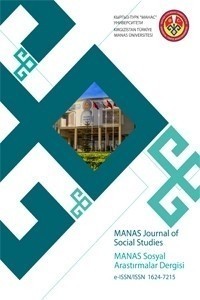Abstract
Dijitalleşme, sayısallaşma, yapay zekâ, makine öğrenmesi gibi kavramların konuşulduğu günümüz bilgi çağının, eğitim öğretim alanındaki en temel sorunlara henüz çare olamadığı açıkça görülmektedir. Özellikle yükseköğretimde ana bilim dalları düzeyinde oluşturulan ve katma değer oluşturması beklenen müfredatlar, programlar ve ders içerikleri bilgi çağının gerisinde seyretmektedir. Öğrencilere analitik düşünme, muhakeme, sorunu tespit etme ve çözüm bulma gibi temel kazanımların verilmesi hususu halen ihmal edilmektedir. Bu yönüyle üniversitelerin etkin kaynak yönetimleri de sekteye uğramaktadır. Bu nedenle bilgi çağının sunduğu yenilikler ve fırsatlar geri planda kalmakta, yükseköğretim seviyesindeki eğitim öğretim, potansiyelden giderek uzaklaşarak vasat altı bir çizgide devam etmektedir. Bu çalışmanın amacı, muhasebe eğitimi kapsamında, katma değer oluşturacak bir eğitim öğretim modeli oluşturamama sorunu detaylı şekilde incelenecektir. Bu bağlamda çalışma kapsamında kavramsal bir çerçeve ile birlikte çok kriterli bir analize de yer verilecektir.
Keywords
References
- Alkan, G. (2015), “İşletmelerin Ön lisans Muhasebe Eğitiminden Beklentileri: İzmir'de Bir Araştırma”, World Of Accounting Science, 17(1)
- Cheng, Y. (2019, April), “Research on the Reform of Accounting Course System Guided by Accounting Education Objectives”, In 1st International Symposium on Education, Culture and Social Sciences (ECSS 2019), Atlantis Press
- Coşkun, S., Kir, A., & Coşkun, S. (2017), “İş Dünyasının Muhasebe Eğitiminden Beklentilerinin Değerlendirilmesine Yönelik Bir Araştırma”, Uluslararası Yönetim İktisat Ve İşletme Dergisi, 13(5), 330-341.
- Çürük, T., & Doğan, Z. (2001), “Muhasebe Eğitiminin İşletmelerin Taleplerini Karşılama Düzeyi: Türkiye Örneği”, ODTÜ Gelişme Dergisi, 28(3-4), 281-310
- Gökçen, G. (1998),” Uygulamacıların Muhasebe Eğitiminden Beklentileri”, Marmara Üniversitesi Muhasebe Araştırma Merkezi Muhasebe-Finansman Dergisi, 9, 43-50
- Kara, Ahmet, (2019), “Bilgi Çağı Türkiye’sinde Üniversite Yönetimi”, 15th Internatıonal Conference On Knowledge, Economy & Management Proceedıngs, Rabat, s. 11-22
- Kızıl, A. (2003), “Olması Gereken Muhasebe Eğitimi ve Yeni Bir Yaklaşım”, XXII. Türkiye Muhasebe Eğitimi Sempozyumu, Gazi Üniversitesi İktisadi ve İdari Bilimler Fakültesi İşletme Bölümü, Antalya, 3-20
- Küçükgöksel, N. Ç., & Akpınar, T. (2016),” İstihdam Odaklı Meslekî Eğitime Yönelik Sorunlar, Talep ve Beklentiler” Tekirdağ SMMM Odası, 6, 1-18.
- Onat, O. K., Osman, A. K. I. N., & Aydoğdu, A. (2019),”Türkiye’de Muhasebe Bilgi Teknolojileri Kullanımının Kariyer Planlaması Etkisi”, Mehmet Akif Ersoy Üniversitesi Sosyal Bilimler Enstitüsü Dergisi, 9(21), 315-327.
- Sayın, K. Şevket, E. Yasemin Yeğinboy ve Fatma Tektüfekçi (2005), “Dokuz Eylül Üniversitesi İ.İ.B.F.'nde Öğrenci Açısından ve Alt Yapı Bakımından Muhasebe ve Finansman Eğitiminin Etkinliğinin Ölçülmesi ve Değerlendirilmesi Üzerine Bir Araştırma”, Mufad Journal, Sayı: 25, Ocak: 101-108.
- Yıldız, F., & Durak, G. (2011), “Üniversitelerde Verilen Muhasebe Eğitiminin Kırklareli Yöresinde Faaliyet Gösteren Küçük ve Orta Büyüklükteki İşletmelerin Beklentilerini Karşılama Düzeyinin İncelenmesi”, Muhasebe ve Finansman Dergisi, (49), 37-47.
- Yıldız, Şule, and Nermin Akyel, "Yeni Muhasebe Uzmanlık Alanlarının Muhasebe Eğitimindeki Yeri Ve Türkiye Örneği" Muhasebe ve Finansman Dergisi 79 (2018)
Abstract
It is clear that today's information age, where concepts such as digitalization, digitization, artificial intelligence, machine learning are discussed, has not yet been able to address the most fundamental problems in the field of education and training. The curriculum, programs and course contents that are created at the level of major disciplines especially in higher education and expected to create added value are behind the information age. It is still neglected to give students basic gains such as analytical thinking, reasoning, problem identification and finding solutions. In this respect, effective resource management of universities is also interrupted. Therefore, the innovations and opportunities offered by the information age remain in the background, and education at higher level continues in a subpar line by increasingly moving away from the potential. The aim of this study is to examine in detail the problem of not being able to create an educational model that will provide added value within the scope of accounting education. In this context, with a conceptual framework, a multi-criteria analysis will be included.
References
- Alkan, G. (2015), “İşletmelerin Ön lisans Muhasebe Eğitiminden Beklentileri: İzmir'de Bir Araştırma”, World Of Accounting Science, 17(1)
- Cheng, Y. (2019, April), “Research on the Reform of Accounting Course System Guided by Accounting Education Objectives”, In 1st International Symposium on Education, Culture and Social Sciences (ECSS 2019), Atlantis Press
- Coşkun, S., Kir, A., & Coşkun, S. (2017), “İş Dünyasının Muhasebe Eğitiminden Beklentilerinin Değerlendirilmesine Yönelik Bir Araştırma”, Uluslararası Yönetim İktisat Ve İşletme Dergisi, 13(5), 330-341.
- Çürük, T., & Doğan, Z. (2001), “Muhasebe Eğitiminin İşletmelerin Taleplerini Karşılama Düzeyi: Türkiye Örneği”, ODTÜ Gelişme Dergisi, 28(3-4), 281-310
- Gökçen, G. (1998),” Uygulamacıların Muhasebe Eğitiminden Beklentileri”, Marmara Üniversitesi Muhasebe Araştırma Merkezi Muhasebe-Finansman Dergisi, 9, 43-50
- Kara, Ahmet, (2019), “Bilgi Çağı Türkiye’sinde Üniversite Yönetimi”, 15th Internatıonal Conference On Knowledge, Economy & Management Proceedıngs, Rabat, s. 11-22
- Kızıl, A. (2003), “Olması Gereken Muhasebe Eğitimi ve Yeni Bir Yaklaşım”, XXII. Türkiye Muhasebe Eğitimi Sempozyumu, Gazi Üniversitesi İktisadi ve İdari Bilimler Fakültesi İşletme Bölümü, Antalya, 3-20
- Küçükgöksel, N. Ç., & Akpınar, T. (2016),” İstihdam Odaklı Meslekî Eğitime Yönelik Sorunlar, Talep ve Beklentiler” Tekirdağ SMMM Odası, 6, 1-18.
- Onat, O. K., Osman, A. K. I. N., & Aydoğdu, A. (2019),”Türkiye’de Muhasebe Bilgi Teknolojileri Kullanımının Kariyer Planlaması Etkisi”, Mehmet Akif Ersoy Üniversitesi Sosyal Bilimler Enstitüsü Dergisi, 9(21), 315-327.
- Sayın, K. Şevket, E. Yasemin Yeğinboy ve Fatma Tektüfekçi (2005), “Dokuz Eylül Üniversitesi İ.İ.B.F.'nde Öğrenci Açısından ve Alt Yapı Bakımından Muhasebe ve Finansman Eğitiminin Etkinliğinin Ölçülmesi ve Değerlendirilmesi Üzerine Bir Araştırma”, Mufad Journal, Sayı: 25, Ocak: 101-108.
- Yıldız, F., & Durak, G. (2011), “Üniversitelerde Verilen Muhasebe Eğitiminin Kırklareli Yöresinde Faaliyet Gösteren Küçük ve Orta Büyüklükteki İşletmelerin Beklentilerini Karşılama Düzeyinin İncelenmesi”, Muhasebe ve Finansman Dergisi, (49), 37-47.
- Yıldız, Şule, and Nermin Akyel, "Yeni Muhasebe Uzmanlık Alanlarının Muhasebe Eğitimindeki Yeri Ve Türkiye Örneği" Muhasebe ve Finansman Dergisi 79 (2018)
Details
| Primary Language | Turkish |
|---|---|
| Journal Section | Review |
| Authors | |
| Publication Date | April 24, 2020 |
| Submission Date | January 8, 2020 |
| Published in Issue | Year 2020 Volume: 9 Issue: 2 |
Cite
MANAS Journal of Social Studies

